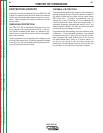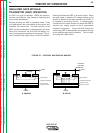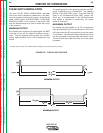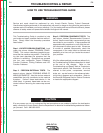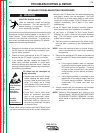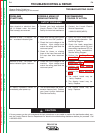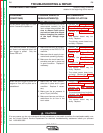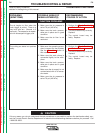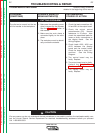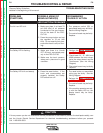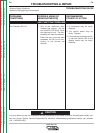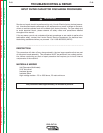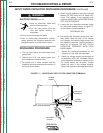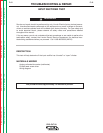
Return to Section TOC Return to Section TOC Return to Section TOC Return to Section TOC
Return to Master TOC Return to Master TOC Return to Master TOC Return to Master TOC
TROUBLESHOOTING & REPAIR
F-5 F-5
PRO-CUT 80
TROUBLESHOOTING GUIDE Observe Safety Guidelines
detailed in the beginning of this manual.
CAUTION
If for any reason you do not understand the test procedures or are unable to perform the test/repairs safely, con-
tact the Lincoln Electric Service Department for electrical troubleshooting assistance before you proceed.
Call 1-800-833-9353.
PROBLEMS
(SYMPTOMS)
POSSIBLE AREAS OF
MISADJUSTMENT(S)
RECOMMENDED
COURSE OF ACTION
FUNCTION PROBLEMS
All the status lights begin to blink
within 5 seconds of power up.
1. Make sure the PRO-CUT 80 is
reconnected correctly for the
input voltage being applied. Be
sure to remove input power
and wait at least one minute
before changing the position
of the input voltage range
switch.
1. Perform the Primary Power
Board Resistance Test and
Capacitor Voltage Test.
2. Perform the Input Rectifier
Test.
3. The control board may be
faulty. Replace.
4. The primary power board may
be faulty. Replace.
The machine powers up properly,
but there is no response when the
gun trigger is pulled. Only the
power LED is lit.
1. Make sure the torch is connect-
ed properly to the PRO-CUT 80
machine.
2. Make sure the air supply is con-
nected and operating properly.
3. Make sure the torch head con-
sumable parts are in place and
in good condition. Replace if
necessary.
1. Perform the Auxiliary Trans-
former Test.
2. Perform the Trigger Circuit
Test.
3. Perform the Gas Solenoid
Test.
4. Perform the Torch Continuity
and Solenoid Test.
5. The control board may be
faulty. Replace.
6. The output power board may
be faulty. Perform the Output
Board Resistance Test.
When the torch trigger is pulled, air
begins to flow; but no pilot arc is
established.
1. Make sure the torch consum-
ables are in place and in good
condition. Replace if neces-
sary.
2. Make sure the air pressure is
set at 70 psi (448 kPa.)
3. Make sure there are no kinks or
restrictions for air flow in the
torch cable.
1. Perform the Torch Continuity
and Solenoid Test.
2. Perform the Low Voltage
Circuit Test.
3. The output board may be faulty.
Perform the Output Board
Resistance Test.
4. The control board may be
faulty. Replace.



